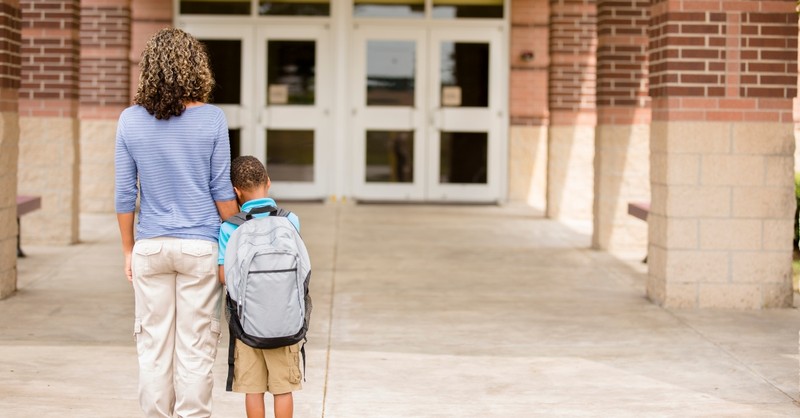
As the height of the summer heat begins to ebb and the long summer days grow ever so slightly shorter, we are reminded that the new school year is about to begin. I’ve been out of school for some time now, but I remember, all too well, that anxious excitement bubbling in my stomach the night before the first day.
I was always a big fan of school. At least the learning part. But, I often found myself anxious about the social aspects. Making friends, joining clubs, dating. When you’re in grade school, life can seem exceptionally small, and your emotions are all-consuming. Arguments with friends seem like the end of the world. Not wearing the latest trends makes you feel outcasted. Mean words from bullies carry a heavy weight. It’s an awkward and overwhelming time, but there is also so much joy in youth.
You’ve likely heard it before, but I’ll say it again: Don’t grow up too quickly. Enjoy the freedom of your pre-teen and teenage years. Don’t spend your time wishing for the future, yearning to be older. Spend it appreciating the chaos of your life now, the freedom to explore new passions, and the beginning of the life-long journey of self-discovery.
But even with that reframing, there is bound to be some anxiety as you head into this new school year. Here are some tips for overcoming these five fears:
Photo Credit: ©Getty Images/Jonathan Kirn

1. Starting something new.
There is always at least a small amount of fear that comes with starting something new. Starting a new grade, starting a new school, joining a new activity. I heard a quote once that changed my life. It said something along the lines of “I’ve spent most of my life scared, but I did it anyway.” Do things scared. Join that club, try out for that sports team, audition for the school play, and roll into your new classes with confidence.
Anxiety when doing something new is actually a sign of respect. It shows that you care enough to worry that you’ll do a good job.
And just remember, you’re not the only one starting something new. Every other person in that classroom or on that ball field is also starting something for the first time. Take solace in the fact that you are not alone on this journey.
Often, I find the start of something is when uncertainty is at its height. Once you get over the hump of the beginning, it starts to become more comfortable. So, as annoying as it may be, my greatest advice is simply to stick it out. The fear will subside as you fall into a comfortable routine.
Photo Credit: ©Getty Images/fstop123

2. Making friends.
Making friends is the number one fear for many students. In fact, a study by WorldMetrics.org found that 60 percent of college students struggled to make friends due to social anxiety. The National Library of Medicine found similar results among elementary-aged students, with about 65 percent experiencing social anxiety.
Making friends was one of my biggest fears, too. Especially when transitioning from elementary school to middle school and then again to high school. But here’s the thing, everyone is worried about making friends.
My number one tip for this is simply to be yourself. To make genuine friendships, you need to show up as yourself. Be the goofy, eccentric, girl you are or the serious, shy boy you are. By being yourself, you’ll attract other people who can relate to you and who truly like you for who you are.
And circling back to point number one, I’ve met most of my closest friends through clubs and activities. In fact, I met my best friends in high school through marching band and two of my best friends in college through Intervarsity Christian Fellowship. Getting involved in a club or activity is an easy way to make friends, because you have a built-in common interest.
Photo Credit: ©GettyImages/Prostock-Studio

3. Performing well in class.
There is so much that goes into performing well in class, and some of it has absolutely nothing to do with you. The teaching style, the difficulty of the content, and the attention you get in the classroom and at home. Each of these aspects plays a huge role in how well a student does in a class. There is little you can do about the things outside your control, but here are some options for tasks you can control.
Set a designated study routine. When I was in high school, I would spend at least an hour or two doing homework and reviewing my notes from class after school. I followed that same format in college, and I always felt better prepared for the next day of class. I know you have a life outside of your classes, but if performing well is important to you, setting a study routine will help. In fact, a 2021 study by the American Society for Cell Biology examining the effects of study habits on test performance found that students with a routine who actively study with limited distractions perform better. A study by Tel Aviv University also found that having a consistent routine can be calming and reduce anxiety. So basically, by setting a routine, you’re setting yourself up for success.
Getting enough sleep is also majorly important. When we are sleeping our brains and bodies are recharging so that we can perform at full capacity. So, pick a specific bedtime and try to stick to it as often as possible.
Photo Credit: ©iStock/Getty Images Plus/Hakase_

4. Standing up to bullies.
Thankfully and unfortunately, there is a lot of talk surrounding bullying these days. I run the risk of very much aging myself when I say this, but, back in my day, conversations about dealing with bullies had only just begun to become more prominent. And on top of that, social media was nothing like it is today, so cyberbullying was not as pervasive.
I don't have all of the answers for handling bullying, but I experienced it all through grade school, so I can at least offer you some insights.
When someone picks on you, it almost always has nothing to do with you. Often, they are taking their own insecurities, frustrations, and identity crises out on someone else in an effort to not deal with their emotions. It doesn’t make their words or antics sting any less. But I hope you remember their words are reflections of them, not you.
I also believe in the power of fighting back with words and killing people with kindness. If someone is picking on you, don’t let them steamroll you, but also be sure not to stoop to their level. Being the bigger person can be exhausting, but it can also make a huge difference in your life and theirs by highlighting the power of kindness. The Bible even asserts this in Ephesians 4:29, which says, “Do not let any unwholesome talk come out of your mouths, but only what is helpful for building others up according to their needs, that it may benefit those who listen.”
When it comes to cyberbullying, utilize the “block” feature. It may seem “uncool” to block the mean or cool kids, but your peace is exponentially more important than some arbitrary idea of coolness. Plus, school is temporal. There’s a finite amount of time you’ll be there. When you’re handed that diploma after strutting across that stage, you don’t ever have to see your classmates again if you don’t want to.
So, I guess this is a really long answer just to say: If you’re being bullied, stand up for yourself, try your best to rise above it, and tell an adult if you need help. And remember, this, too, shall pass.
Photo Credit: ©Getty-Motortion

5. Preparing for the future.
This is particularly important for high school and college-aged students. There can be much anxiety when deciding if you want to go to college, applying for the right ones, figuring out what you want to study, taking the right internships, applying for jobs after college, or deciding to continue your education.
While all of these questions are important and should be answered, one thing I wish I would have been more vigilant about was living in the now. I wish I wasn’t so scared I’d make the wrong decision that I spent more time stressing than living. In the wise words of Albus Dumbledore, “It does not do to dwell on dreams and forget to live.”
Have dreams, plan for the future, and be driven, but do not forget that so much of life happens in the liminal space, the time in between destinations.
That said, here are a few practical steps for planning for the future:
- Give yourself plenty of time to complete your college, financial aid, scholarship, grad school, and/or job applications.
- Get organized about it by making checklists and spreadsheets. I always find the more organized I am, the less stressed I am. So, lay out all of your tasks and required information (saved money, tax documents, transcripts, etc.) in front of you.
- Show yourself some grace. At the ripe age of 28, I still have no idea what I want to do. I’m still trying new things and figuring out which job and lifestyle make my heart sing. You don’t have to have it all figured out now. You’re allowed to take your time. You’re allowed to try things in a less traditional way. You’re allowed to change your mind. The Lord knows I have, over and over and over again. By showing yourself that grace, life may take you in directions you never thought possible. For example, I used to want to be a hard-hitting journalist. That was, until I realized that my soul was far too sensitive for that. Last week, I shot a commercial for a non-profit. Never in a million years did I think that would be my life. But God takes us in many directions, and often the ones we least expect are the ones where we grow the most.
Proverbs 3:5-6 says, “Trust in the LORD with all your heart and lean not on your own understanding; in all your ways submit to him, and he will make your paths straight.”
Photo Credit: Pexels/VisionPic.net
Originally published Wednesday, 21 August 2024.








